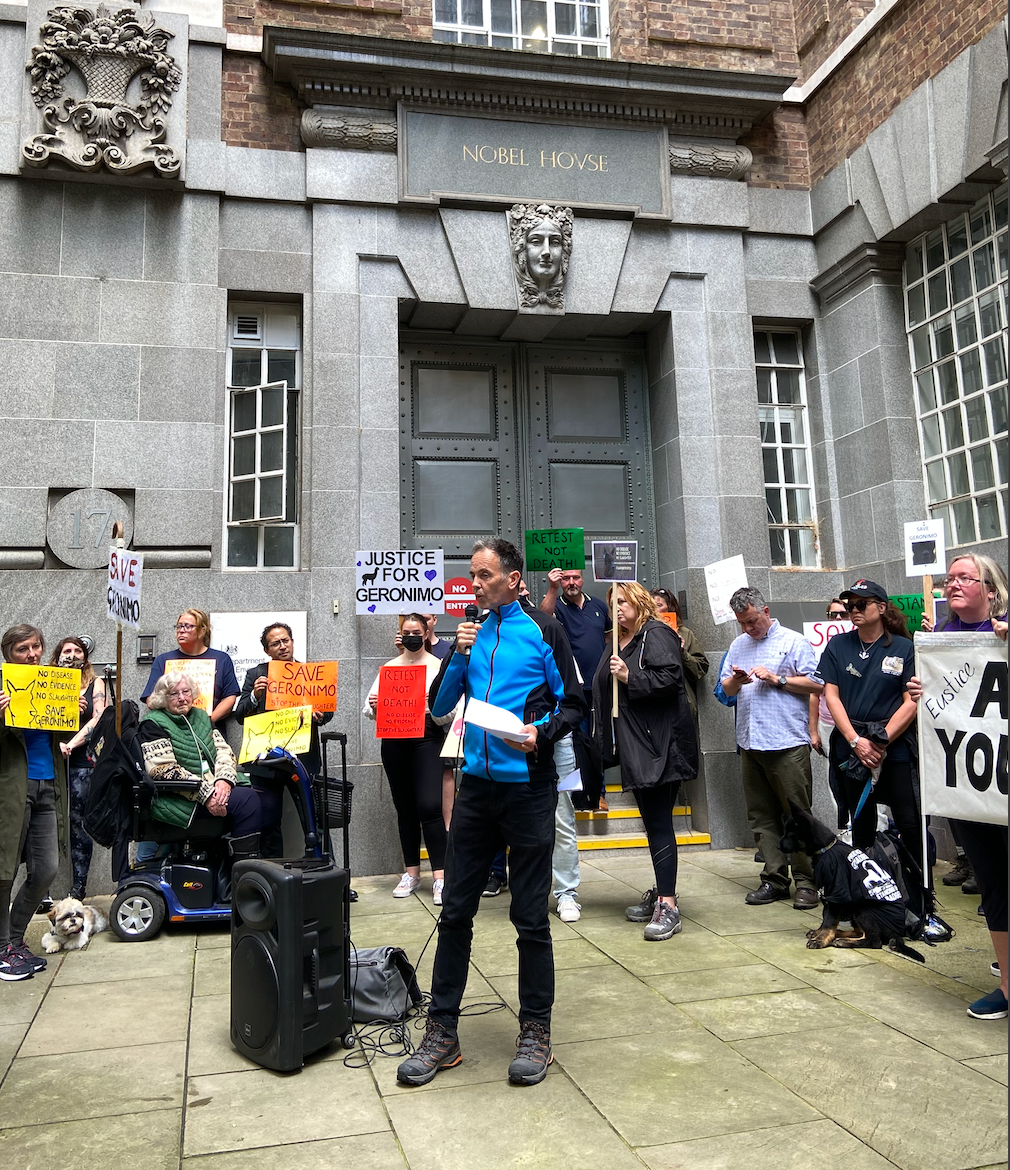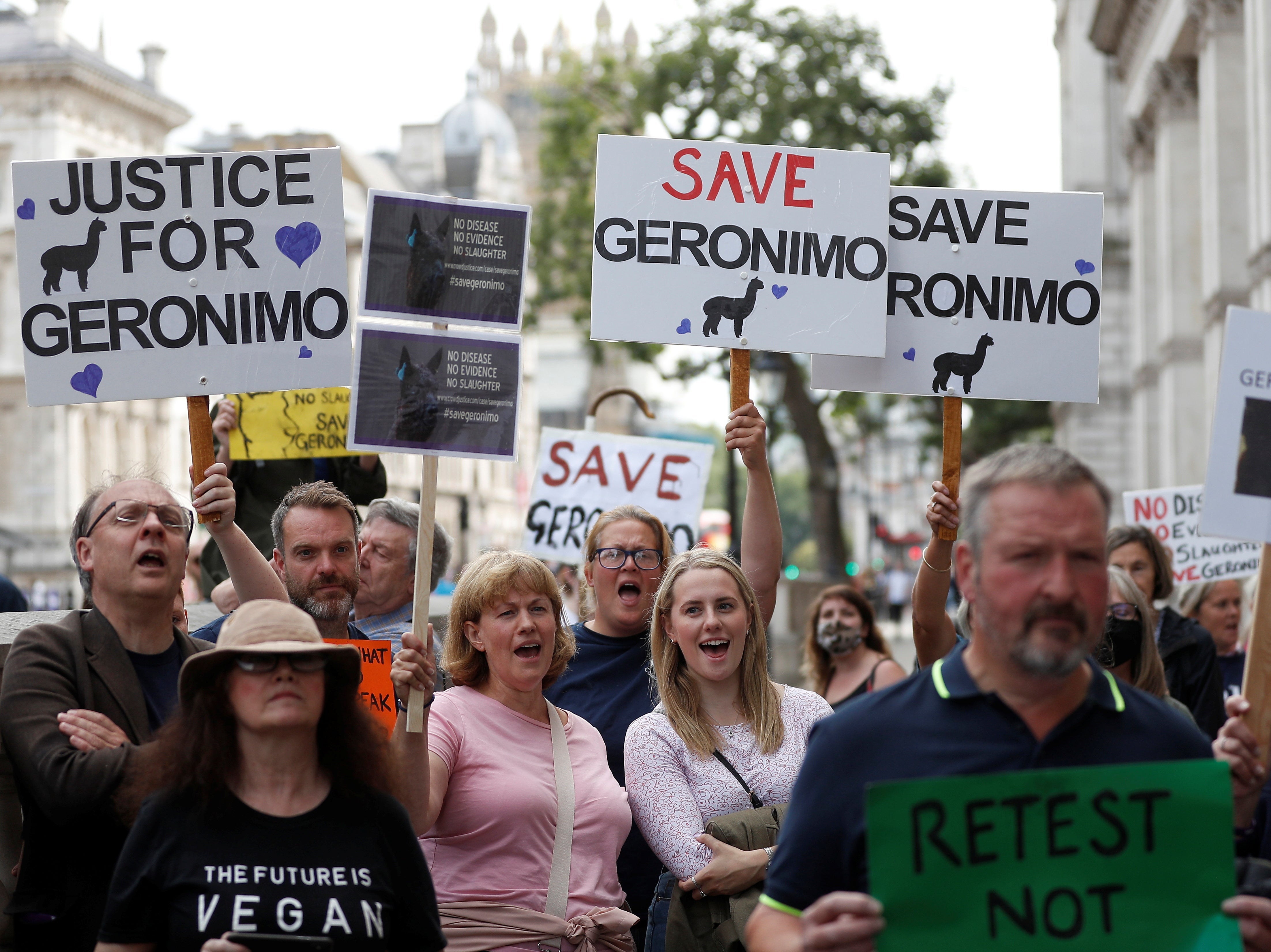Government making ‘disingenuous’ claims in defending decision to kill Geronimo, expert claims
Alpaca farmers, vets, and campaigners have protested in Westminster against the decision to kill Geronimo
The government has been “disingenuous” in its rebuttal of suggestions a testing system used to condemn Geronimo the alpaca to death is “inaccurate”, an expert has claimed.
The Department for Environment, Food, and Rural Affairs (Defra) has doubled down in backing its testing system for detecting bovine TB (BTB) in alpacas, after coming under fire for its warrant to have the eight-year-old animal put down.
Geronimo’s death warrant, after his owner Helen MacDonald’s appeal was rejected in the High Court at the end of July, has prompted questions over the accuracy of the BTB testing system.
The department, led by environment secretary George Eustice, published a blog post to counter what it said was “misleading coverage in several media outlets”, after about 40 alpaca farmers, vets, and campaigners had staged a protest outside Defra’s office and Downing Street to call on the government to test Geronimo again with a different BTB test.
In 2017, Geronimo had twice tested positive for bovine TB in the UK with the Enferplex test that his owner, farmers and campaigners have said is inaccurate and outdated.
The campaigners have claimed that the tests returned “false positives”, attributing this to a tuberculin primer injection administered to increase sensitivity of the blood test.
In New Zealand, before Ms MacDonald exported him to the UK, he had tested negative for BTB four times with skin tests.
Defra says in its new blog that the chances of a false positive using the Enferplex test is 0.34 per cent.
The department has also said that the use of tuberculin “does not induce a false positive antibody response in animals that have not been exposed to the bTB bacterium in the first place.”
However, Dr Iain McGill, a practicing vet, former government adviser, and BTB expert, told The Independent that the peer-reviewed study cited by Defra should not be used as evidence to support the the assertion Enferplex is the most accurate test for detecting BTB in alpacas.
He said this is because the report, which was published in 2012 and updated in 2018, “doesn’t mention priming [with tuberculin] at all”.
Defra also claims that the Enferplex test has been “specifically developed and validated for alpacas and is the most accurate test.”
Dr McGill suggested the Enferplex test was not initially developed for alpacas, but was later adapted for use on them.
He also claimed that the test is not valid for use on alpacas that have been primed with tuberculin, such as Geronimo, and that Defra’s insistence that there is only a “0.34 per cent chance of a false positive” only applies to unprimed alpacas.
Dr McGill accused Defra of “trying to muddy the waters” by issuing “disingenuous” statements.
“Unless you was a scientist, you wouldn’t spot it,” he said.

When The Independent put his claims to Defra, it responded by saying that “there is no scientific basis” for the argument that the tuberculin primer can cause false positives.
Defra added: “The injection essentially amplifies the antibodies already in the animal because of infection, but does not trigger the production of new antibodies.”
Meanwhile, Bob Broadbent, a vet and a former president of the British Veterinary Camelid Society, told the Daily Mail the government has not published any data on how priming alpacas before blood tests affects results, despite years of requests for it to do so.

It was recently revealed that Karlie, an 11-year-old alpaca, had tested negative post-mortem for BTB after the government had ordered for her to be put down in 2018.
At Monday’s protest, Dr McGill had told The Independent that “all hell will break loose” if Geronimo is killed under government orders and then it transpires after a mandatory post-mortem test that he did not have BTB.
He said that farmers who had lost alpacas by government-ordered killings, before finding out that their animals did not have BTB, could get together to file a class action case against Defra.
It is illegal for Ms MacDonald to test Geronimo while he is still alive, as the government had outlawed the private testing of animals that have tested positive for BTB, Dr McGill has also said.
According to Defra, 28,356 cattle were compulsorily slaughtered in England in the 12 months to March 2021. A total of 205 camelids, which include alpacas and llamas, were culled in 2020.
Join our commenting forum
Join thought-provoking conversations, follow other Independent readers and see their replies
Comments
Bookmark popover
Removed from bookmarks